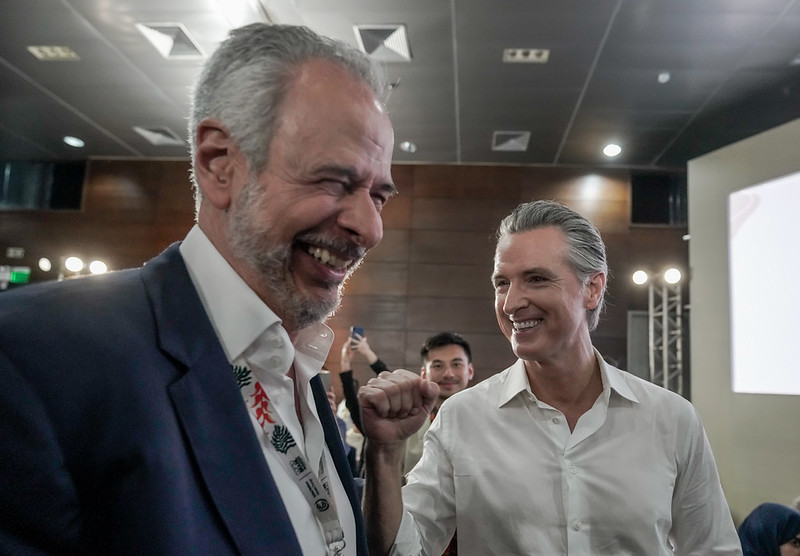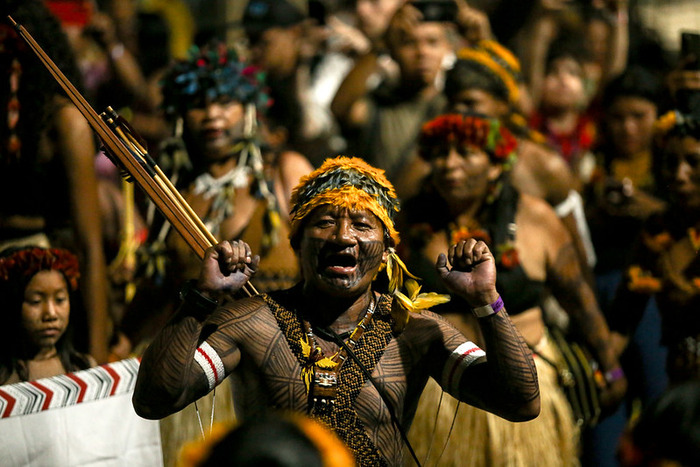India spoke on behalf of developing countries on the need of CBDR and adaptation
After a smooth first day where the Presidency finalised the agenda for the conference without much hassle, the second day of COP30 turned out to be altogether different. The hangar at the Amazonian city of Belem lit up with the intensity of protests, strong statements during the plenary by India, and California governor Gavin Newsom’s unfiltered criticisms of the US’ withdrawal from climate action.
Protesters, which some outlets have reported were from indigenous communities, clashed with security personnel at the COP30 venue, and the Blue Zone had to be evacuated. The clash resulted in damage to the front entrance of the venue.
India emphasised the importance of equity, common but differentiated responsibilities and respective capabilities (CBDR-RC) while delivering statements on behalf of the BASIC (Brazil, South Africa, India and China) group and the Like-Minded Developing Countries (LMDC).
Considering that long-term climate finance discussions have been postponed to COP31 and there was no mention of CBDR in the Baku to Belem Roadmap of realising $1.3 trillion in climate finance, India’s determined stand is vital.
Reiterating the importance of CBDR
“We, the LMDCs, speak here for over half the world’s population. As we celebrate multilateralism, we must be cognisant of the factors that can seriously undermine multilateralism. Multilateralism is the most opportune moment to meaningfully discuss climate change, related trade, restrictive unilateral measures and how they impact our countries. In this era of implementation, the means are among some of the biggest detriments for developing countries. And that is why we have presented our proposal for an agenda item on article 9.1 of the Paris Agreement which speaks to the legal obligations of the developing countries to provide finance and to developing countries for mitigation and adaptation,” said India’s spokesperson at the plenary session.
Under the Paris Agreement, Article 9.1 talks about the responsibility of developed countries in providing financial resources to developing countries for both mitigation and adaptation.
“In line with Article 9, 10 and 11 of the Paris Agreement, the Presidency must make a special call to the Parties to submit their National Adaptation Plan in line with national priorities and progress, including providing adequate support for preparation and implementation of the NAPs on just transition. We must establish here institutional arrangements that systematically integrate the principles of the UNFCCC and its Paris Agreement in the implementation of the Just Transition Work Programme (JTWP),” said India’s spokesperson.
Furthermore, noting that climate finance continues to be the key barrier to raised ambition, India called for “a clear and universally agreed definition of climate finance, and strengthened and scaled-up public finance flows for adaptation.”
The COP30 presidency insists that this is an implementation COP, and President André Corrêa do Lago said on Day 1 that he hopes it will be an adaptation COP as well. This stance was reiterated by the Brazil delegation during the plenary session.
India also reiterated this fact, by noting that adaptation financing needs to increase 15x more than current flows, calling for a strong outcome on the Global Goal on Adaptation (GGA). However, India is yet to submit its updated NDC.
During the Presidency Consultation on Article 9.1, the Like-Minded Developing Countries (LMDCs), which includes India, proposed a three-year work programme to implement 9.1 and deliver a binding action plan with milestones on concessionality, predictability and additionally. The group also urged tripling adaptation finance and linking 9.1 with the delivery of the NCQG.
Looking southwards
During a press conference led by Arunabha Ghosh, the COP30 South Asia Envoy, the panelists focused on how building a robust South-South leadership for climate action has immense potential.
Ghosh pointed out five gaps in the tackle against climate change. “Fill the five gaps — solidarity, partnerships, implementation, adaptation and finance,” he said.
“The Global South needs to be made investable on its own terms by freeing up their fiscal space, by empowering regional banks and by building project pipelines that deliver both profit and purpose,” said Ghosh, who is also the CEO of the Delhi-based think tank CEEW.
Attempting to bring back US
This is the first time in the history of COP where the US does not have a single official delegate in attendance. “It’s an abomination, a disgrace. I’m here so that the US does not become a footnote,” said Gavin Newsom, the governor of California, during a press conference held at COP30.

Newsom has been keen to convey the work still being carried out by local leaders – despite the imposition of anti-climate policies from the Trump administration. “Donald Trump is doubling down on stupid,” said Newsom.
Around 56,000 delegates have registered to attend COP30, one of the biggest in the history of COP, second only to COP28 in Dubai. Brazil is leading the largest delegation with 3,805 people.
About The Author
You may also like
Rising Global Energy Demand Fuel Security Threats: WEO Report
COP30 kicks off with eyes on big developing countries
World Off-Track on Climate Goals as Temperatures are Predicted to Rise: Report
Brazilian President Calls For Fossil Fuel Phase Out, launches Biofuel Push at COP30
What can India’s bilateral carbon credit deals learn from the centralised global carbon market?

